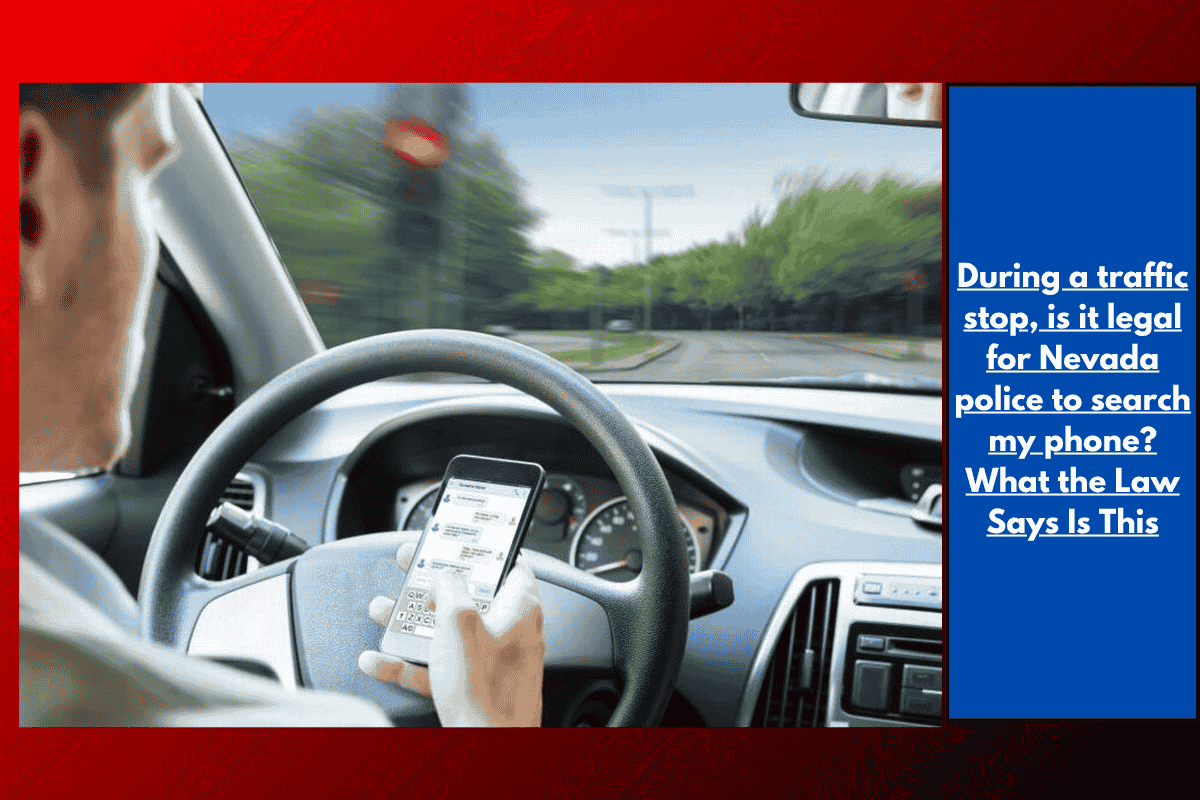When you’re pulled over during a traffic stop in Nevada, you may wonder if the police have the right to search your phone. With smartphones being an essential part of daily life, containing personal information, messages, and even sensitive data, the question of whether law enforcement can access your phone during a traffic stop is one many people ask. Understanding the laws surrounding phone searches during traffic stops is essential for knowing your rights and what to expect if you are stopped by the police.
The General Rule: The Fourth Amendment and Privacy Rights
The Fourth Amendment of the U.S. Constitution protects individuals against unreasonable searches and seizures by the government. This means that, in most cases, police officers must have a valid reason or a warrant to search your personal belongings, including your phone. However, the situation becomes more complex when you’re dealing with a traffic stop, which often comes with different rules.
Can Nevada Police Search Your Phone Without Your Consent?
In general, law enforcement cannot search your phone during a traffic stop without your consent, a warrant, or an exception to the rule. This is because a phone is considered private property, and under the Fourth Amendment, police typically need a valid reason to search it. Here’s a closer look at what the law says:
Consent to Search
If an officer asks to search your phone during a traffic stop, you have the right to refuse. If you consent to the search, the officer can legally look through your phone. However, this consent must be voluntary, and you have the right to say no. If you don’t give consent, the officer cannot search your phone without further legal justification.
Search With a Warrant
If the police want to search your phone during a traffic stop and you refuse consent, they would typically need a search warrant to do so. The Fourth Amendment requires law enforcement to obtain a warrant from a judge or magistrate based on probable cause before they can search your phone, unless there’s an exception to the rule.
Exceptions to the Warrant Requirement
There are a few situations where law enforcement may be able to search your phone without a warrant:
Search Incident to Arrest: If you are arrested during a traffic stop, police may have the right to search your phone as part of a search incident to arrest. However, in 2014, the U.S. Supreme Court ruled in Riley v. California that police generally cannot search the contents of your phone just because you’re arrested. They must still have a warrant, or an exception like exigent circumstances, to search your phone’s data.
Exigent Circumstances: In some cases, police can search your phone without a warrant if there are urgent circumstances, such as the risk of evidence being destroyed. For example, if the police have reason to believe your phone contains critical evidence that could be lost before they can get a warrant, they might conduct a search under this exception. However, this is a very limited exception and requires clear justification.
Probable Cause
In some situations, police might be able to search your phone if they have probable cause to believe that your phone contains evidence of a crime. This might happen during or after a traffic stop if, for example, they suspect you are involved in illegal activities, like drug trafficking or driving under the influence (DUI). Even in such cases, law enforcement would still typically need to obtain a warrant to search your phone’s contents.
What You Should Know About Nevada Laws and Police Searches
Nevada, like all states, follows federal constitutional protections under the Fourth Amendment, meaning that the rules about phone searches during traffic stops align with federal law. Additionally, Nevada law does not specifically grant police officers broader powers to search your phone during a traffic stop, beyond the general rules of consent, probable cause, and a warrant.
In general, Nevada police cannot search your phone without either your consent, a warrant, or a valid exception to the rule. If you’re unsure about your rights during a traffic stop, you can politely ask if you are free to leave, and if not, you can request to speak with a lawyer.
What Can You Do If Police Search Your Phone Without Your Consent?
If you believe that Nevada law enforcement officers searched your phone illegally, you can challenge the search in court. If evidence is obtained from an unlawful search, it may be excluded from the case, a legal principle known as the “exclusionary rule.” You should contact a criminal defense attorney immediately if you believe your rights have been violated.
In Nevada, police generally cannot search your phone during a traffic stop without a valid reason, such as consent, a warrant, or a clear legal exception. If you are asked for access to your phone, you have the right to refuse consent unless there’s a lawful reason for the search. Understanding your rights during a traffic stop is essential to ensuring your privacy is protected. Always remember that you have the right to politely refuse a search and ask if you are free to leave.
SOURCES
[1] https://www.antheminjurylaw.com/nevada-bill-would-allow-phone-searches-after-crash/
[2] https://www.shouselaw.com/nv/blog/warrant/when-are-nevada-police-allowed-to-search-my-cell-phone-do-i-have-to-give-my-passsword/
[3] https://joeygilbertlaw.com/blog/your-rights-during-police-searches-in-nevada/
[4] https://www.shouselaw.com/nv/defense/laws/search-and-seizure/
[5] https://www.askadamskutner.com/nevada-law-resources/nrs-484b-165-cell-phone-while-driving/














